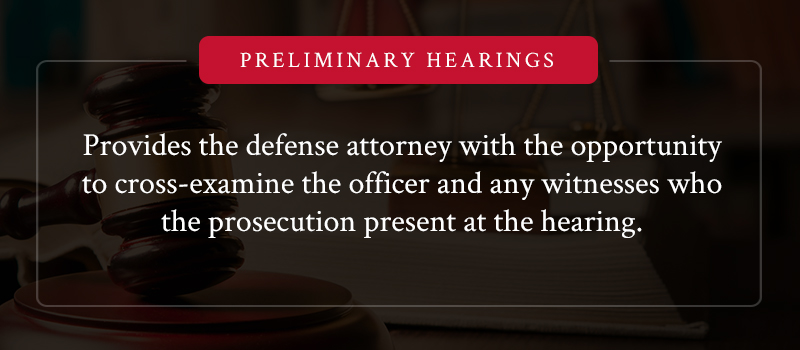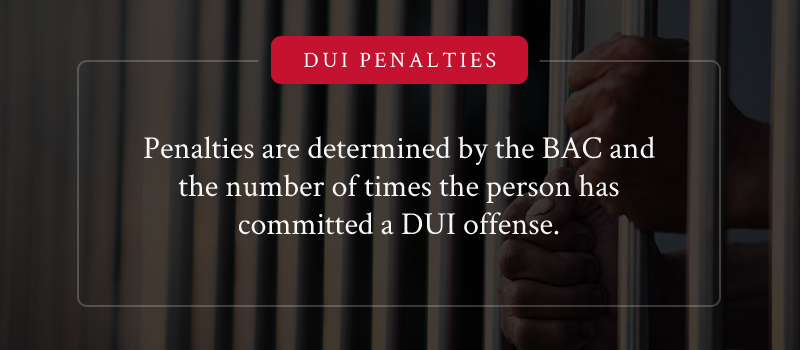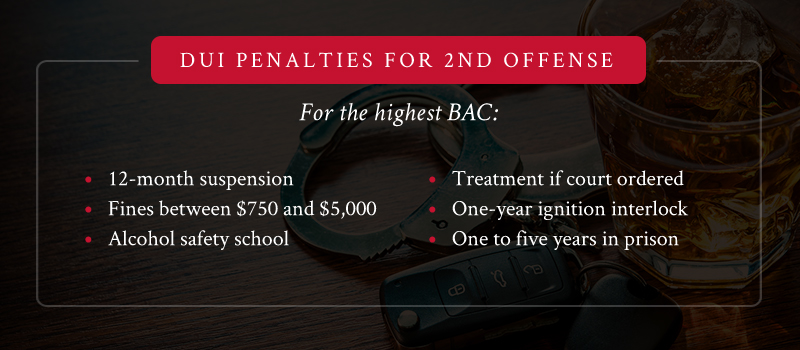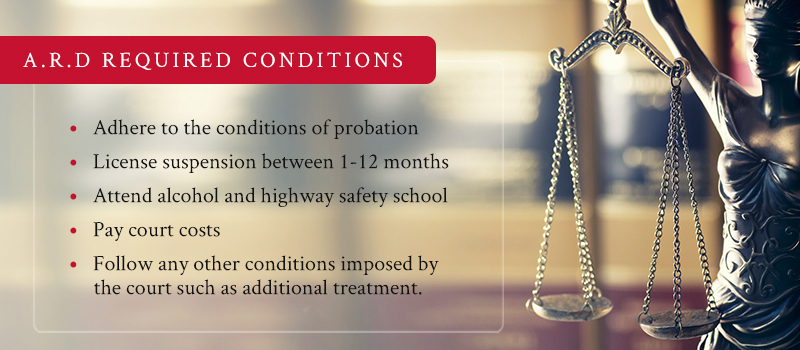Table of Contents
- What Happens After A DUI In PA?
- What Happens At A Preliminary Hearing for DUI?
- Criminal Court in Pennsylvania
- DUI Penalties for A First-Time Offender
- DUI Penalties for Second Offense
- Penalties for DUI with Two Prior Offenses
- Underage DUI Penalties
- Ignition Interlock for DUI
- ARD for DUI
- How to Get Help for DUI
PA BAC Limit
Whether or not you understand the legal process in Pennsylvania, you may not understand the changes in DUI law that occurred in September of 2003. Act 24 lowered the legal BAC limit for DUI from 0.10 to 0.08. The governor signed into law a piece of legislation that created a tier when it comes to penalties and enforcement of DUI convictions.
The tiers are determined by BAC and prior convictions. There are also more provisions of treatment especially for first-time offenders, thereby changing the focus from strictly punishment. This law increased the penalties for first-time offenders. The levels are as follows:
- General impairment — 0.08-0.099% BAC
- High BAC — 0.10-0.159% BAC
- Highest BAC — 0.16% and above
What Happens If You Get a DUI in PA?
Once a police officer in Pennsylvania stops you under suspicion of DUI, they may arrest you if they have probable cause to believe you were intoxicated at the time of driving. After the arrest, they will take you back to the police station, where you have the option of taking a blood, breath or urine test. The important thing to remember about the breath test is that there is no standard equipment used in each police department.
When the person arrested opts for a blood test, they must be taken to a hospital or clinic where a phlebotomist will need to draw blood. The blood test will take approximately three weeks to return. Police officers usually don’t ask the driver to provide urine tests unless there is a suspicion of driving under the influence of drugs in addition to alcohol. It is important to note the driver who has been arrested does not have the right to refuse a blood, breath or urine test.
Most of the time police officers don’t file a complaint, or document that issues the charges against the arrested driver until the blood results are received, unless it is a second or subsequent offense. After the filing of the complaint, a preliminary hearing will be scheduled. If the accused driver has not already hired an attorney prior to the scheduling of the preliminary hearing, it is important they hire an attorney before they go to the hearing.
If, for some reason, the results of the blood or urine tests are not available prior to the preliminary hearing, it is important for the attorney to ask for a continuance as there is no point in holding the preliminary hearing without those results.
What Happens At A Preliminary Hearing for DUI?
So you may be thinking, “I got a DUI, what now?” Prior to the preliminary hearing, the attorney will have the chance to speak with the arresting officer to see if they are willing to reduce the charges. The attorney will likely be able to obtain the blood or urine test results from the arresting officer prior to the preliminary hearing.
The preliminary hearing provides the defense attorney with the opportunity to cross-examine the officer and any witnesses who the prosecution present at the hearing. The preliminary hearing is held at a magisterial district court before a magisterial district judge. The burden of proof on the prosecutor at the preliminary hearing stage is much lower than at the trial stage.
At the preliminary hearing, the prosecutor must only establish there was justification for the charges filed in the complaint. At the trial stage, the prosecutor needs to show the evidence is sufficient to convict the accused beyond a reasonable doubt. It is important to note even if the case is bound over for trial at the preliminary hearing stage, you will not lose your license at this stage in the judicial process. Only PennDOT has the ability to revoke your license.
Criminal Court in Pennsylvania
Assuming the magistrate decides that there is enough evidence to send your case to trial, the judge will schedule a formal arraignment in the Court of Common Pleas. At the time of the formal arraignment, the judge will be apprised of several things, such as whether there is the possibility of a plea agreement or whether there is a delay in the case.
If your case is bound over for trial and no plea agreement is reached, you will then go to trial. It is possible to be convicted or to plead guilty. If you plead guilty at this stage, you may be wondering what comes now with a DUI conviction. The next steps are:
- You will have to pay for an evaluation, which will show whether or not you have an alcohol abuse problem.
- You will need to attend an alcohol highway safety school, which has a mandatory time of at least 12 hours.
- After the evaluation, sentencing is scheduled. This includes the mandatory minimum fine as well as jail time for repeat offenders.
- You will also have your license suspended.
First Offense DUI in PA
Penalties are determined by the BAC and the number of times the person has committed a DUI offense.
The lowest level of BAC is between 0.08 and 0.099%, which is considered general impairment. A high BAC is between 0.10-0.159%. And the highest BAC is 0.16% and higher. Keep in mind:
- Administrative penalties for a first-time DUI offender in Pennsylvania do not include any mandatory minimums for general impairment. An offender may incur a $300 fine, alcohol highway safety school, and treatment when ordered. For this lowest tier, there is no license suspension.
- The administrative penalty increases to one year of license suspension for a high BAC. Fines range from $500-$5,000. There is also a requirement to attend an alcohol highway safety school and treatment if court ordered.
- For the high and highest BAC tiers, the administrative penalty is a license suspension for one year with the possibility for the suspension of hardship/occupational licenses to be restricted except for the last ten months. Fines are between $1,000-$5,000. Attendance at alcohol highway safety school is also required, as is treatment if court ordered.
- A refusal to submit to testing under the implied consent laws has the penalty of a one-year suspension.
- Criminal penalties include fines and the possibility of incarceration. For general impairment, there is no minimum for incarceration. However, there is a requirement for six months of probation.
- For a high BAC, there is a mandatory minimum of jail time for two days with a maximum of six months.
- With the highest BAC, there is a minimum of three days in jail and can be as much as six months.
- Prior convictions will remain on the offender’s record for ten years.
- Minors, commercial drivers, bus drivers, school vehicle drivers and those involved in an accident where property damage occurs or where someone is injured are subject to the same penalties as those offenders with the highest BAC even if their BAC is not in the highest category. This penalty will apply to those who also refuse BAC testing.
DUI Penalties for Second Offense
When you receive a second offense, DUI penalties may include:
- Administrative penalties include 12 months of license suspension for general impairment. There are also fines between $300 and $2,500, alcohol safety school, treatment if court ordered, and one-year ignition interlock.
- For a high BAC, the administrative penalties include a 12-month suspension, fines between $750 and $5,000, alcohol highway safety school, treatment if court ordered, and a one-year ignition interlock.
- For the highest BAC or use of a controlled substance, the administrative penalties are an 18-month license suspension, alcohol highway safety school, court-ordered treatment, and one-year ignition interlock.
- Criminal penalties for a low BAC include 5 days to six months in jail.
- For a high BAC, the criminal penalty is 30 days to six months in jail.
- The penalty for the highest BAC is between 90 days to five years in prison.
DUI Penalties for Two Prior DUI Offenses
When you have two previous DUI offenses, penalties may include:
- Administrative penalties for general impairment include a twelve-month license suspension, treatment when court ordered, a fine between $500 and $5,000, and a one-year ignition interlock.
- A high BAC will garner administrative penalties of an 18-month license suspension, a fine between $1,500 and $10,000, treatment when ordered, and a one-year ignition lock.
- The highest BAC includes administrative penalties of an 18-month license suspension, fines between $2,500 and $10,000, treatment if court ordered, and a one-year ignition interlock.
- Criminal penalties for general impairment include between ten days to two years in prison.
- High BAC criminal penalties may mean incarceration between 90 days to five years.
- The highest BAC criminal penalties mean the accused may serve between one and five years in prison.
DUI Penalties for Third Offenses
There is only one level where the delineation changes from two or more prior DUI offense to three or more prior DUI offenses, and that is at the high BAC level. At that level, the only difference between two prior DUI offenses and three or more is the prison time increases to one to five years rather than 90 days to five years, which is required for drivers with two prior DUI offenses. All the administrative penalties remain the same.
Underage DUI in PA
Drivers under 21 do not need a BAC of 0.08% to be arrested for drunk driving. Their BAC only needs to be 0.02% for them to be arrested for DUI. Furthermore, underage persons who are arrested for drunk driving also face additional penalties. These penalties include fines up to $500, charges for underage drinking, and charges for carrying false IDs.
Ignition Interlock Device
Drivers may apply for exceptions to the ignition interlock device in certain situations. For example, if a driver convicted of DUI can show the installation of the ignition interlock device on all of their vehicles will create a financial hardship, an exemption could be granted. This exemption would then only require installation on one vehicle. It is important to remember the cost of the ignition interlock device is assumed by the person convicted of DUI.
In certain situations, an employment exception may be granted. The driver would need to show they should be allowed to operate company vehicles during the scope of their employment. These vehicles would not need to have ignition interlock installed. The work vehicle used by the employee can’t fall under the category of school bus or very large multi-passenger vehicle, and the driver will need to carry proof the employer has been notified of the ignition interlock requirement.
Alternatives to Traditional Sentencing
A.R.D., or Accelerated Rehabilitation Disposition, is a method of receiving reduced sentences and fines. Additionally, A.R.D. allows for PennDOT to expunge A.R.D. records after a period of ten years as long as the person’s driving privileges weren’t revoked because they were considered a habitual offender. The driver must not have been a commercial driver when they were charged with the DUI.
A driver is eligible for the A.R.D. program if it is the first time they have been placed in the program. Furthermore, they must not have killed or seriously injured anyone during their DUI. And they can’t have been charged with other serious vehicle violations when they received the DUI charges.
A.R.D. requires certain conditions and may cost at least $1,500, which doesn’t include court costs and attorney fees.
The conditions are as follows:
- Adhere to the conditions of probation.
- Receive a license suspension between one and twelve months.
- Pay and attend alcohol and highway safety school.
- Pay court costs.
- Follow any other conditions imposed by the court such as additional treatment.
Get the Best Help During This Difficult Time
From arrest to trial to sentencing, navigating a DUI charge can be a complicated process. That is why it is important to retain legal counsel as soon as possible. Rather than just worrying, “I have a DUI, what is there to do?”, you should be moving forward and seeking to retain legal counsel. Hiring an attorney who is not only experienced but pays attention to detail is vital.
That is why you should contact the law offices of MPL Law. Our York, Pennsylvania-based attorneys will provide you with the best possible representation in your case.





